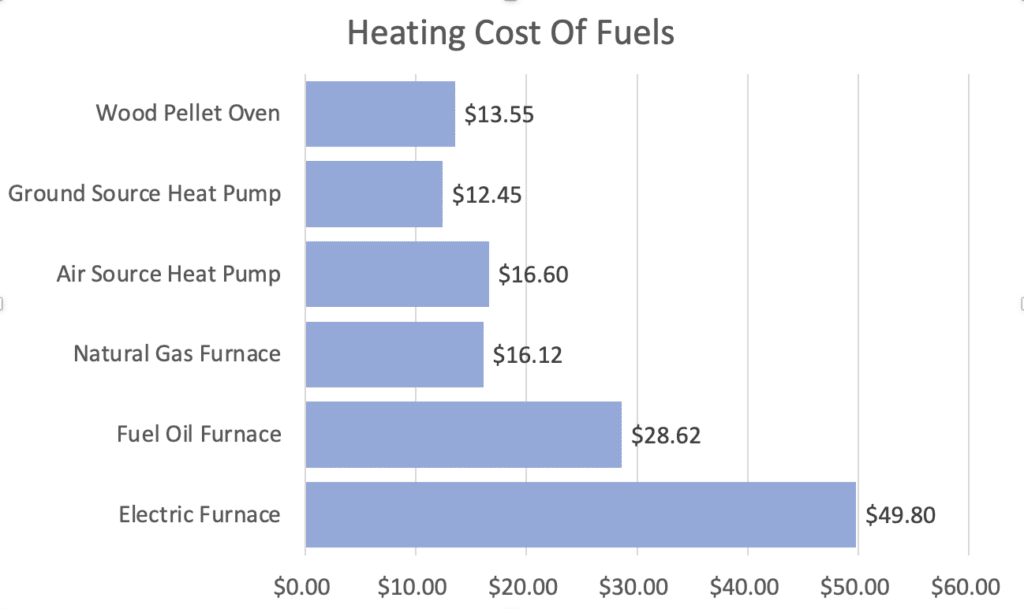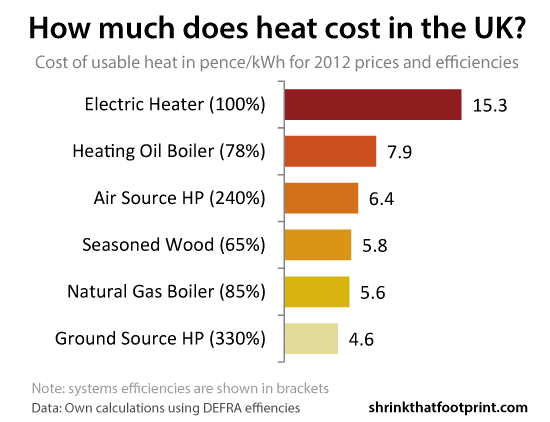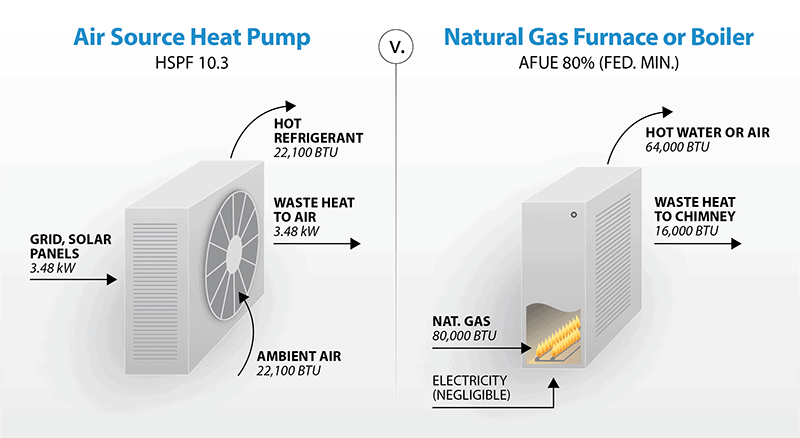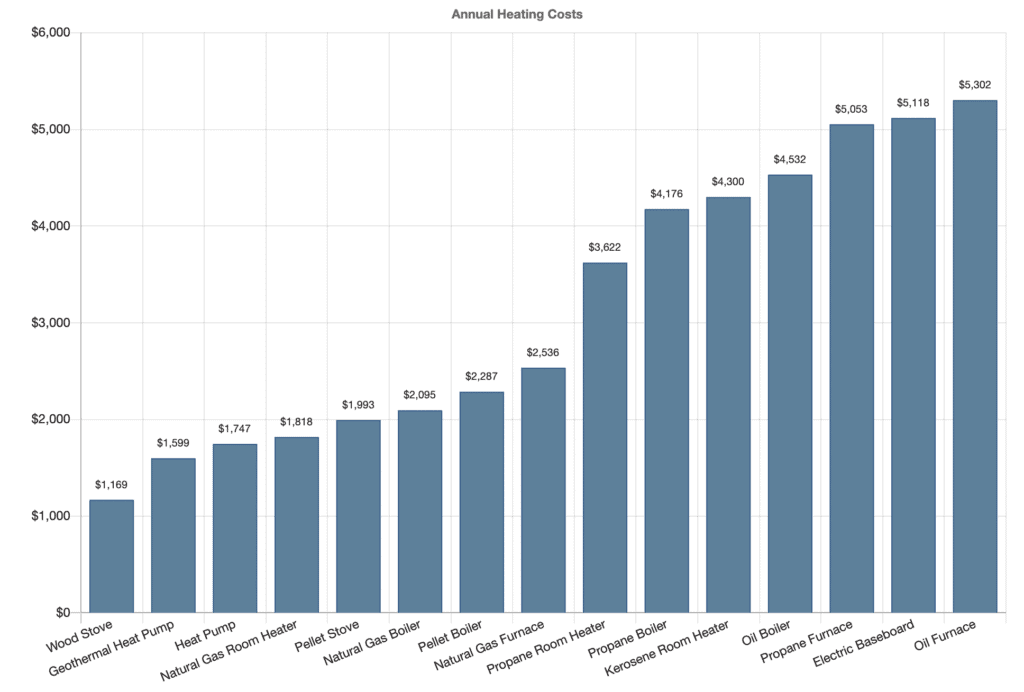Introduction – Heating Cost Comparison
[Update: We updated our analysis as of Jan 2024. Specifically, we updated the US heating cost chart using the most recent data from EIA.gov and device efficiencies]
This is the third post in our Beginner’s Guide to Heating Bills, it follows average heating bills and heating fuel use. In this post, we will compare heating prices for different fuel sources.
The results of our analysis are below. You can see already that oil and electricity are very costly whereas natural gas and heat pumps are much more efficient.

Comparing “Heat Price” Is More Accurate Than Fuel Price
Heat price is the amount you pay per unit of heat delivered. It is much more accurate to compare heating devices this way than to compute fuel costs.
Inherently, fuel costs are hard to compare because fuels are measured in different ways: electricity is measured directly in kWh delivered whereas heating oil is measured in gallons.
Moreover, fuels pass through devices like a boiler or furnace that turns them into usable heat. Because this occurs at varying efficiencies the price of usable heat can be very different than the price of fuel. In this post we are going to compare the cost of oil heat, gas heat, electric heat and wood heat in the US and UK.
Therefore, we convert all fuel costs into “heat costs”, which measures the cost per unit of heat delivered. This unit of heat could be the therm, the BTU or kWh. In this article, we picked BTU or more accurately, millions of BTU (MMBTU).
In the end, we find that electric heating is expensive, more than gas or wood, and a bit more expensive than even oil. As heating gets more expensive you might find it helpful to take a look at our article on supplemental heat sources.
Table Of “Heat Prices” For The US (2024)
For people interested in the underlying data we used EIA.gov for energy densities in 2024 and costs and a variety of sources for efficiencies. EIA doesn’t seem to track the cost of seasoned wood so we pulled that from a different resource.
| Device | Fuel Type | Efficiency | Fuel Cost | Energy Density | Cost per million BTU |
| Electric Furnace | Electricity | 98% | $0.17 / kWh | 3412 BTU / kWh | $50.84 |
| Fuel Oil Furnace | Heating Oil | 78% | $3.965 / gal | 138500 BTU / gal | $28.62 |
| Natural Gas Furnace | Natural Gas | 82% | $16.70 / 1000 cu ft | 1036000 BTU / 1000 cu ft | $16.12 |
| Air Source Heat Pump | Electricity | COP 3 | $0.17 / kWh | 3412 BTU / kWh | $16.60 |
| Ground Source Heat Pump | Electricity | COP 4 | $0.17 / kWh | 3412 BTU / kWh | $12.45 |
| Wood Pellet Oven | Wood Pellets | Varies | $229 / ton | 16904000 BTU / ton | $13.55 |
For more information, use the following links:
Conversion From kWh To BTU – A Note On Units Of Energy
We use both units of BTU and kWh. It’s confusing to use two units. Why do we do it? That’s because different devices, countries and utilities prefer different measurements. They are both units of energy or heat energy. To convert the two, use this table.
| Unit | Equivalent |
| 1 kWh | 3412.14 BTU |
| 1 BTU | 0.000293 kWh |
In words, 1 kWh is 3412 BTU, and 1 BTU is 0.000293 kWh. The kilowatt hour (kWh) is a unit of energy. Why does it have an “hour” in the unit? The hour comes from the fact that energy is defined in terms of power multiplied by time.
Implicit is that power is then energy used over time. Sometimes we want to know the power draw. Let’s say a furnace uses 10 kWh of energy in 24 hours to heat the home. One can also say it’s a 0.41 kilowatt (kW) device that ran for 24 hours. So the total energy used was 0.41 kW times 24 hours or 10 kWh.
US Heating Cost Comparison
In the image at the top of this post we compared the typical cost of heat for different fuels based on average prices and typical conversion efficiency. The units are $/million British Thermal Units (BTU), which as an Australian, living in the UK, looking across the pond, I find very strange.
Electric Heating And Oil Heating Are The Most Expensive Ways To Heat A Home In The US
What these heating costs show is that in the US both fuel oil furnaces and electricity furnaces are an expensive way to heat a home. Electric heat is the most expensive type of heating.
To get cheaper heat using electricity you need to use a heat pump. The very cheap natural gas prices in the US mean gas heating is much cheaper, explaining its dominance for central heating.
A few things are worth noting.
First these figures are based on the average system efficiency shown in the brackets. If this increased the price would come down and if the efficiency was worse it would be more expensive (as for an old furnace).
Secondly, these are only fuel costs. A full evaluation for a new system choice would include capital costs of the system. The low cost of buying an electric heating system may explain part of why they are more common in milder climates, as well as limitations on gas infrastructure.
UK Heating Cost Comparison
In the UK electric heating is the far more expensive by a big margin. For this comparison we’ll use the default units of pence/kWh of usable heat.

Heating your home with standard electric heaters is almost three times as expensive as using heat from a natural gas boiler. Electric heat is the most expensive type of heating again.
This reality is often overlooked when people try to economize by using electric space heaters. If you have gas central heating it can be more sensible to use radiator valves to limit heating to a small number of rooms.
As before these prices are for the fuel only and are affected by the actual efficiencies. For comparing a new install you would want to consider capital costs of the heating system too. For the carbon intensity of different heat sources see our Shrink Your Housing Footprint page.
Oil Heat Ws Electric Heat – Which Is Better And By How Much
Oil heat is slightly more expensive than electric heat in the US. Many people ask about this specific match up. When oil-powered furnaces get old, homeowners want to replace them.
So naturally they want to know if the replacement could be electric. They have a lot of choices now. Switching to electricity is certainly among them.
In the US, switching from oil to electric would save costs by 6%, or from $37.3 per million BTU to $34.9 per million BTU. But before you think that’s great savings, take a look at the next section.
Natural Gas Heat Vs Electric Heat – Which Is Better And By How Much
Natural gas heat is much cheaper than electric heat in the US. The annual cost of natural gas heat is only $9.2 per million BTU compared to electric heat of $34.9 per million BTU.
That means natural gas heat is less than 30%-40% the cost of electric heat. The reason is because natural gas furnaces pound for pound are more efficient in generating heat energy.
The study in Maine we cited below came up with similar figures. In their surveys annual costs for electric heat is $5,000 whereas annual costs for natural gas heat is $2,000.
So natural gas heat costs 60% less than electric heat. We cover this in detail for every state in this article on Natural gas heating vs electric heat costs.
Heat Pumps Are More Efficient Than All Of The Above Technologies
In these statistics, often overlooked are heat pumps. I suspect this is because heat pumps are not so widely adopted. In fact, there is a misconception that heat pumps don’t work in cold climates, where people are most worried about the cold, dead of winter.
The efficiency of a heat pump depends on the difference of temperatures between the outside and inside. The greater the difference, the less efficient it will work against the difference.
Recently, New York, Maine, Massachusetts, Oregon have put forth heat pump rebates for installing new systems. This encourages residents to switch from less efficient heating systems to more efficient ones.

Do Heat Pumps Work In Winter?
In the deepest of winter, the difference can be between near 0 Fahrenheit outside and ambient 68 Fahrenheit inside. The heat pump will absorb heat from the outside and bring it inside.
When its so cold, there’s less heat to be absorbed. Of course, anyone who knows basic thermodynamics and statistical mechanics knows that above absolute zero, even if its cold, molecules are moving.
If molecules are moving, there’s heat! So in theory, heat pumps are still moving heat from outside to inside in the middle of winter. The question of course is whether they move enough heat to keep the occupants of a home from freezing.
The Answer Is Yes The New Generation Of Cold Climate Heat Pump Works Well In Cold Winters
The conventional wisdom many years ago was that heat pumps “don’t work well” in cold climates. The warning is that an old heat pumps struggles below 40 degrees Fahrenheit .
The answer now is different – heat pumps will work in cold climates. In fact, with new technology, they will work down to 5 degrees Fahrenheit.
The technology of these “Cold Climate Heat Pumps” (CCHP) is based on something called an “inverter-driven variable-speed compressors” and innovative engineering of the refrigerant pipe architecture.
Resources To Read More About The Technology And Find A Supplier
Mitsubishi description of inverter technology in cold climate heat pumps.
Resource for finding cold climate heat pump suppliers and specs.
Is Heating With An Electric Furnace Cheaper Than A Heat Pump?
The state of Maine was one of the first to become convinced of the superiority of the new cold climate heat pumps. The state set up a quasi-government agency “Efficiency Maine”.
The agency administered rebates for heat pumps in 100,000 homes. The program was a big success. Leading up to the program was data collected to compare the cost of using a heat pump to everything else.
A Modern Cold Climate Heat Pump Is 65% Cheaper Or 2.9 Times Cheaper Than An Electric Furnace
The results were startling. The cold climate heat pump outperformed almost every other type of heating. The cold climate heat pump is 30% cheaper than a gas furnace, and 67% cheaper than an oil furnace.

Next up in this guide is the sources of home heat loss.
Lindsay Wilson
I founded Shrink That Footprint in November 2012, after a long period of research. For many years I have calculated, studied and worked with carbon footprints, and Shrink That Footprint is that interest come to life.
I have an Economics degree from UCL, have previously worked as an energy efficiency analyst at BNEF and continue to work as a strategy consultant at Maneas. I have consulted to numerous clients in energy and finance, as well as the World Economic Forum.
When I’m not crunching carbon footprints you’ll often find me helping my two year old son tend to the tomatoes, salad and peppers growing in our upcycled greenhouse.

Is this meant to be in best case? as the info is just wrong.
start with the kw its .47 not .17 in Ma making your rated best heat the 2ed worst in for cost.
Add in that the colder it is the worse heat pumps work…..